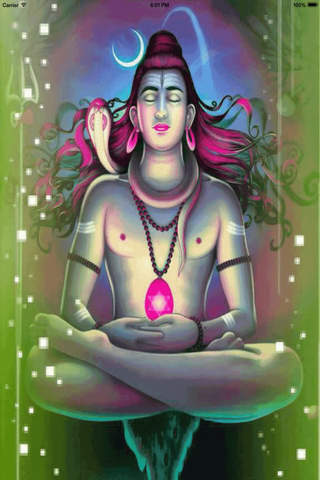
Shiva Aarti / Mahadev Aarti / Shiv Shankar Aarti - Virtual Pooja
Shiv Pooja Aaradhana Temple is a temple, mandir, shiva nu mandir to worship the god without going to maandir. You can do live aarti, live darshan at your mobile finger tips. Application contain shiva wallpaper and devotee can worship her. All things together acts as a live wallpaper too.
See Application Fuctions Are Listed Below:
1). You can play shank.
2). You can play bell / Ghant / Ghanta.
3). You can play aarti with small ganti / bell.
4). Flowers to offer.
5). You can offer flowers mala also
About shiva Jee
Shiva (Sanskrit: Siva, meaning "The Auspicious One"), also known as Mahadeva (Great God), is a popular Hindu deity. Shiva is regarded as one of the primary forms of God. He is the Supreme God within Shaivism, one of the three most influential denominations in contemporary Hinduism. He is one of the five primary forms of God in the Smarta tradition, and "the Destroyer" or "the Transformer" among the Trimurti, the Hindu Trinity of the primary aspects of the divine.
Shiva has many benevolent and fearsome forms. At the highest level Shiva is limitless, transcendent, unchanging and formless. In benevolent aspects, he is depicted as an omniscient Yogi who lives an ascetic life on Mount Kailash, as well as a householder with wife Parvati and his two children, Ganesha and Kartikeya and in fierce aspects, he is often depicted slaying demons. Shiva is also regarded as the patron god of yoga and arts.
The main iconographical attributes of Shiva are the third eye on his forehead, the snake Vasuki around his neck, the crescent moon adorning, the holy river Ganga flowing from his matted hair, the trishula as his weapon and the damaru as his instrument.
Shiva is usually worshiped in the aniconic form of Lingam. Temples of Lord Shiva are called shivalayam.
Etymology and other names
Shiva absorbed in meditation, as depicted commonly in Hinduism
The Sanskrit word Shiva (Devanagari: ???, siva) comes from Shri Rudram Chamakam of Taittiriya Samhita of Krishna Yajurveda. The root word si means auspicious. In simple English transliteration it is written either as Shiva or Siva. The adjective siva, is used as an attributive epithet not particularly of Rudra, but of several other Vedic deities.
The other popular names associated with Shiva are Mahadev, Mahesh, Maheshwar, Shankar, Shambhu, Rudra, Har, Trilochan, Devendra and Trilokinath.
The Sanskrit word saiva means "relating to the God Shiva", and this term is the Sanskrit name both for one of the principal sects of Hinduism and for a member of that sect. It is used as an adjective to characterize certain beliefs and practices, such as Shaivism.
The Tamil word Sivan, Tamil: ????? could have been derived from the word sivappu. The word sivappu means "red" in Tamil language but while addressing a persons skin texture in Tamil the word Sivappu is used for being Fair Skinned.
Adi Sankara, in his interpretation of the name Shiva, the 27th and 600th name of Vishnu sahasranama, the thousand names of Vishnu interprets Shiva to have multiple meanings: "The Pure One", or "the One who is not affected by three Gunas of Prakrti (Sattva, Rajas, and Tamas)" or "the One who purifies everyone by the very utterance of His name." Swami Chinmayananda, in his translation of Vishnu sahasranama, further elaborates on that verse: Shiva means "the One who is eternally pure" or "the One who can never have any contamination of the imperfection of Rajas and Tamas".
Shivas role as the primary deity of Shaivism is reflected in his epithets Mahadeva, Mahesvara, and Paramesvara ("Supreme Lord").
There are at least eight different versions of the Shiva Sahasranama, devotional hymns (stotras) listing many names of Shiva. The version appearing in Book 13 (Anusasanaparvan) of the Mahabharata is considered the kernel of this tradition. Shiva also has Dasha-Sahasranamas that are found in the Mahanyasa. The Shri Rudram Chamakam, also known as the Satarudriya, is a devotional hymn to Shiva hailing him by many names.


